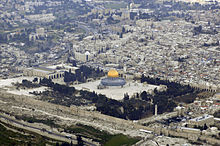


Tourism in the Palestinian territories is tourism in East Jerusalem, the West Bank, and the Gaza Strip. In 2010, 4.6 million people visited the Palestinian territories, compared to 2.6 million in 2009. Of that number, 2.2 million were foreign tourists while 2.7 million were domestic.[1] In the last quarter of 2012 over 150,000 guests stayed in West Bank hotels; 40% were European and 9% were from the United States and Canada.[2] Major travel guides write that "the West Bank is not the easiest place in which to travel but the effort is richly rewarded."[3]
The Palestinian tourism ministry and Israeli tourism ministry have attempted to work together on tourism in the Palestinian territories in a Joint Committee.[4] Recent cooperation to share access to foreign tourists has not proven successful in Palestine for many reasons.[5] Israel controls the movement of tourists into the West Bank.[6] Palestinian tour guides or transportation companies have not been able to enter Israel since 2000, and in 2009, Israel's Ministry of Tourism deleted the West Bank and any Palestinian area from its materials. Former Palestinian Authority Tourism Minister Kholoud Diibes has commented "that Israel collects 90% of [religious] pilgrim-related revenue".[7] Foreign tourism has been restricted to East Jerusalem and the West Bank since the August 2013 indefinite closing of the Rafah crossing located between Egypt and the Hamas controlled Gaza Strip.[8] There is essentially no tourist flow to Gaza since 2005 because of the ongoing Israeli military land, sea, and air blockade.

In 2013 Palestinian Authority Tourism minister Rula Ma'ay'a stated that her government aims to encourage international visits to Palestine, but the occupation is the main factor preventing the tourism sector from becoming a major income source to Palestinians.[9] There are no visa conditions imposed on foreign nationals other than those imposed by the visa policy of Israel. Access to Jerusalem and the West Bank is completely controlled by the Government of Israel. Access to Gaza is controlled by Israel and Egypt. Entry to the occupied Palestinian territories requires only a valid international passport.[10] U.S. citizens who are suspected of being Muslims, Arabs, or "being participants in planned political protest activities or of supporting NGOs that are critical of Israeli policies" are often subjected to extensive questioning from immigration officials.[11] These groups of tourists are subject to delay, interrogation, or even, denial of access to lawyers, consular officers, and family, and denial of entry.[12][13][14]
- ^ M'aan (26 September 2011). "PCBS: Marked increase in West Bank tourism in 2010". M'aan. Archived from the original on 18 June 2013. Retrieved 10 October 2012.
- ^ "Europeans Dominate Visitor Arrivals to Palestine in 2012".
- ^ Israel and the Palestinian Territories. p254. Lonely Planet Publications. 2012
- ^ Enz, Cathy A. (2009). Hospitality Strategic Management: Concepts and Cases (2 ed.). John Wiley and Sons. p. 273. ISBN 978-0-470-08359-8.
- ^ "Destination Palestine: Tourism's Denied Potential". Archived from the original on 2013-07-24. Retrieved 2014-03-07. Dec. 18, 2012 Retrieved March 7,2014accessed
- ^ Kaufman, David; Marisa S. Katz (16 April 2006). "In the West Bank, Politics and Tourism Remain Bound Together Inextricably". New York Times. Retrieved 2 July 2010.
- ^ Purkiss, Jessica (22 March 2014). "Tourism as a tool to erase Palestinian identity". Middle East Monitor. middleeastmonitor.org.uk. Archived from the original on 1 December 2014. Retrieved 15 Sep 2014.
- ^ "Egypt shutters Gaza border crossing 'indefinitely'". The Times of Israel.
- ^ "Palestine News & Info Agency - WAFA - Tourism in Palestine an Act of Solidarity, says Minister of Tourism". Archived from the original on 2013-11-27. Retrieved 2013-09-16.
- ^ "Entering and Exiting Jerusalem, the West Bank, and Gaza | Consulate General of the United States Jerusalem". Archived from the original on 2014-03-18. Retrieved 2014-03-15.
- ^ "Israel, the West Bank and Gaza Country Specific Information". U.S. Department of State.
- ^ "Israel asks Arab visitors to open emails to search". Associated Press. 2012-06-04 – via Fox News.
- ^ Hass, Amira (2013-02-27). "Israel Denies Entry to American Teacher Working in West Bank". Haaretz.
- ^ Hass, Amira (2013-05-19). "Israel effectively barring tourists from West Bank by neglecting to explain mandatory permit". Haaretz.